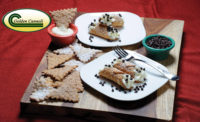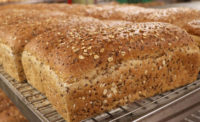Distinction is often the key to successful branding—something that makes a product stand out in the crowd. And when a bakery brings a new level of distinction to a product category, it raises the bar for everyone else, possibly even setting a new gold standard that others aspire toward.
Such is the case with Innovative Bakery Resources (IBR), which has built a high degree of specialization into its Tualatin, OR, bakery, raising the bar for baked goods like breads that feature high levels of inclusions, swirls, toppings, fillings and enrobing. These are breads that draw second glances and build names for themselves across the industry.
Bringing memories to life
 IBR, today a division of Ardent Mills, Denver, was first started by a couple of passionate bakers looking to create a good, quality bread product back in 1996 in Lake Oswego, OR. In September 2012, IBR moved into its new production facility, allowing the bakery to grow its capabilities and offerings.
IBR, today a division of Ardent Mills, Denver, was first started by a couple of passionate bakers looking to create a good, quality bread product back in 1996 in Lake Oswego, OR. In September 2012, IBR moved into its new production facility, allowing the bakery to grow its capabilities and offerings.
Passion is at the heart of IBR. “Nothing beats the aroma of fresh-baked bread,” says Ken Ruud, business development leader. “Some of my favorite memories as a child are of the smells coming from the kitchen, where my mom put love into every sweet loaf she made for us. Combine that love with a passion for making dreams real, taking ideas and turning them into products that build loyal followings—that is what is done every day at IBR, and is what drew me into this business.”
Now IBR is in the business of creating new memories for the consumers of its specialty breads, which includes a wide variety of fresh and frozen, sweet and savory bread products. Many are fruit-filled, swirled, marbled, butter-streusel topped, chocolate-enhanced and/or enrobed with seeds. Products range from 100 percent whole grain to conventional and USDA organic. Pan-size capabilities include thin, thick, large and mini loaf sizes, and the bakery is no stranger to creating customized pans, says Ruud.
“We have an ‘ideation-to-shelf’ operation model through our research and development and technical support capabilities to ensure our bread products are unique and delicious in the marketplace,” says Ruud. “We can do it all, from a classic white bread to an indulgent sweet or savory bread with lots of inclusions.”
Ruud sees two pathways to success. “The products that are most successful must meet one of two key criteria in my opinion: You’ve either got to be the first, or be the best,” he says. “Why not aim for both? Get the best product you can in consumers’ mouths and let them decide. When you put your best foot forward, you give yourself the best chance to win. I’ve seen it time and again: The breads in which we’ve stayed true to differentiating through having the highest quality and taste have stood the test of time and have the most-avid fan base.”
Breakfast breads, such as swirled cinnamon raisin, are among IBR’s best-selling products. The bakery also notes a shift toward cleaner ingredient decks and more use of whole grains in recent years.
“The increase of healthy eating is not the whole story,” says Scott Dillingham, general manager. “Consumer demand for local, sustainable, pure and more—or as Ardent Mills calls it, ‘enlightened eating’—is here to stay. At IBR, we see this in the breads we make every day.” He notes that white whole-wheat flours allow IBR to bring more nutrition to products without changing the taste, texture or appearance. He also says that featuring sprouted grains is a big consumer trend now, an approach IBR uses in its Sprouted Apple bread.
“Seasonal offerings have also been a hit recently, as they allow us to keep our customer’s portfolio fresh and exciting, while solving the production and supply-chain challenges that are inherent with in-and-out programs,” says Ruud. “Some of the more-recent items we’ve launched include a chocolate-filled and graham-cracker-streusel-topped S’mores bread, as well as a Peach Mango bread, which will make your taste buds perform cartwheels.”
Inside IBR
The IBR facility is LEED Silver Certified, a green-building certification program that recognizes best-in-class building strategies and practices, notes Dillingham.
The IBR bread process often is not highly automated. Customization is the key to the success of its specialty breads, so lines are modular, with interchangeable equipment brought in as dictated by the requirements of bakery formulas. Many of IBR’s products are custom, high-touch specialty breads that don’t fit within a high-speed production model.
“We have multiple lines, but we have equipment that is mobile to allow us to produce a wide variety of products,” says Dillingham. “Our equipment is set up in a plug-and-play environment to allow us to change quickly.”
Improvements to food safety and operational efficiency are ongoing. “We are continually looking to improve our processes and equipment, focusing on food safety and efficiencies, while maintaining the qualitative attributes of our products,” says Dillingham. The bakery was designed with separate zones to isolate the cooling and packaging area from the rest of the bakery to reduce microbiological risks.
The flexibility of the IBR model lets customers experiment with products before investing in a full production run. “We thrive on partnership,” says Dillingham. “We offer our customers the opportunity to use us as a pilot-plant to trial breads before they launch at a larger scale.”
Contract manufacturing and private label are also a big part of the IBR business plan. “We are different from most other bakers in that our mission is to build the brand portfolios of our customers, and not our own brands,” says Ruud. “Every item we make is for the building of someone else’s primary consumer base, a responsibility that we do not take lightly. We take great pride and care in getting to know our customer’s consumers, and make every effort to delight them. When our customers succeed, we succeed.”
IBR’s roots are in helping its customers be “the first” or “the best” in their categories—feats that require the bakery to continually ideate. “I do not see that foundation changing,” says Ruud. “As the pace of consumer palates continues to move at lightning speed, there will be an even greater need in these arenas. It takes a bold company with a high degree of trust and employees who are not afraid to challenge traditional thinking in order to achieve success.”
Ruud notes that IBR works with many well-known innovators in bakery today. “We partner with a wide range of manufacturers, traditional, club and mass retailers, as well as foodservice operators,” he says. “The latter is an area in which we believe there is opportunity for accelerated growth. As foodservice operators look for ways to stand out, one of the most-impactful and cost-effective ways to do so is through your bread offerings.”
IBR has about a 50-50 mix of fresh versus frozen distribution. “For customers nearby our plant, we offer fresh delivery and pickup in short- and longer-term shelf-life options,” says Ruud. “Our breads function just as well when thawed and allow us to distribute frozen from coast-to-coast throughout all 50 states, as well as into Canada.”
Innovative results
IBR has helped shift consumer focus to see bread as the star—versus simply acting as the “carrier” or playing second fiddle to the spread. “IBR has stepped up its game and challenged conventional thinking by creating exciting taste- and texture-filled bread products that lead the differentiation sought by our customers and consumers alike,” says Ruud. “There will always be a time and place for high-speed, traditional white and wheat breads, buns and rolls. But when you want to make an impact, you need to look no further than ‘the carrier’ as a way to excite taste buds with a sweet or savory bread product that adds pizazz to your offerings.”
IBR sees its location as a boon to innovation. “Home is where the heart is,” says Ruud. “For us, if an idea can succeed in our home markets of Seattle, Portland and San Francisco, we believe it can succeed anywhere. Our home markets are some of the most cutting-edge culinary cities in the world, and the birthplace of several key food and beverage industry trends.”
A big part of IBR’s success has been an unwillingness to accept the status quo. “Our employees embrace change and challenge the status quo every day,” says Dillingham. “To be successful, we need to continually look for new ways to add value for our customers. This requires us to have increased changeovers and running multiple trials.”
Ruud notes that IBR thrives on making its customers’ ideas a reality. “If you’ve ever had what you thought to be a great idea and had someone else tell you that ‘it can’t be done,’ you’ve likely felt frustration in having the air let out of your creative sail,” he says. “Removing obstacles and bringing inventive bread ideas to life are what we are most passionate about. IBR exists to drive innovation to the baking industry, whether the ideas come from us or our customer.”










